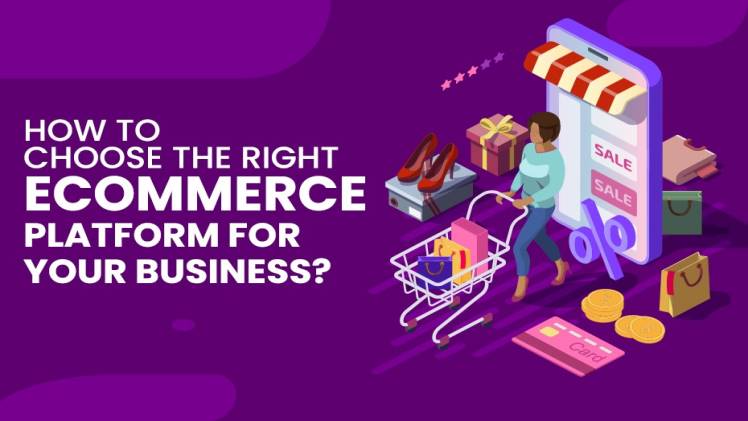How to Choose the Right eCommerce Platform for Your Business?

When you choose the right eCommerce platform for your business, it’s like laying the proper foundation for your new house. The decision impacts the value your business will get from a B2B eCommerce development company. Each platform offers unique features, costs, and benefits for you to pick from. However, choosing an incompatible platform will lead to wasted resources, missed growth opportunities, and extra charges. On the other hand, selecting the right platform for your business will bring you several benefits. These include creating a solid online presence, better user experience, quick lead generation, and increased Return on Investment (ROI).
Selecting an eCommerce Platform that is Best Suited for your Business
Once you start your online eCommerce store, the main focus is to create a positive customer experience. This will allow you to sell products to your customers irrespective of their location or preferred shopping destinations. An eCommerce platform can do that, along with other offerings. It is not a medium to buy and sell but an entire ecosystem that supports and gives you better business control. Today, several eCommerce platforms are emerging with similar functionalities; picking the perfect one for your business can be a challenging task. Thus, we share some important considerations before you zero down on a platform. These factors will help you select the best platforms for your online store.
Security
Security threats have become very prevalent in recent times. Customers have become aware of the ongoing scams by hackers and thieves. They will only buy from you if they know their financial data will remain secure. Thus, it is important that whichever platform you choose has the following security features.
- (Payment Card Industry) PCI compliance
- (Secure Sockets Layer) SSL certificate
- Data backups and
- Fraud prevention
You can select the platforms built upon object-oriented programming languages. They have integrated embedded security protocols. Your chosen platform must also perform regular security checks to identify potential threats and deal with them accordingly.
SEO
SEO fills the void between you and your customer. It’s the highway that connects the two points. Search engines are vast chasms of data, and your store is like a small needle in a haystack. There are thousands of online stores selling the same product as yours. So, how will you attract potential customers to your site? The answer is SEO. SEO makes your site rank higher and more visible in search engines.
This is why the platform you choose must integrate SEO features into the products you offer. For instance, it must allow you to write meta tags, add blogs to your site, use your domain name, get customer reviews, Google site map support, and more. These features will have a positive impact on your rankings.
Responsive Web Design
These days, most shoppers make online purchases via their smart mobile devices. The eCommerce platforms must recognize this sizeable mobile-using customer segment. The websites must allow customers to easily access the site and make quick purchases from their mobile devices. There’s a catch! If the eCommerce stores make a separate site for mobile owners, then not only will it increase the costs, but they will also have to manage different marketing campaigns. So, the best way is to use a responsive web design for users. They will adjust automatically to the screen sizes. You can easily access the site using a desktop, phone, tablet, or laptop.
Supports Multiple Selling Channels
eCommerce sites can quickly boost revenue by offering products and services on multiple selling channels. You must go for a platform that will allow you to cross-sell your deliverable across many channels like FB Messenger, Instagram, Amazon, and more. They must also have a centralized inventory management system to keep tabs on your inventory across the channels and notify you of any changes like less stock, out-of-stock, selling fast, not selling, etc. Partnering with Top Amazon Marketing Agencies can further amplify your reach and ensure that your products gain the visibility they deserve on one of the largest selling platforms. This will help you resolve any issue as soon as it arises and generate revenue.
Integrations
All eCommerce platforms come with the necessary integrations to render the functionality of any online site. Still, as a store owner, you may need more plugins and integrations suited for your business, such as tax calculators, accounting, payment gateways, shipping apps, email marketing tools, and more. You must opt for a platform that supports integrations and plugins important for your business and has an active community that continuously works to improve the platform and resolve any issues surrounding it.
Technical Support
Unforeseen circumstances like server crashes, software outages, and server downtimes can happen anytime. These can negatively impact the customers trying to access your site. Moreover, it leads to a loss of revenue and a bad brand image. It would help if you had a prompt technical support team for your eCommerce platform to stop such situations from escalating. Go with a platform that offers 24/7 technical support or quick query resolution. Learn about the charges and their mode of communication for your site.
Scalability
Your eCommerce site will grow once you invest your time and resources. Therefore, you must go with a platform that can accommodate the growing size of your business. They must not charge exorbitant fees for support, storage, and features you may need.
Price
It all boils down to the pricing. An eCommerce platform’s price depends on factors like setup, configuration, design, hosting, maintenance, customization, etc. Before picking a platform, compare the pricing and its advantages and disadvantages. These parameters will help you get the best at an ideal price point. Do not just go for the least or most expensive option; research.
Conclusion
Choosing the right eCommerce platform as a first-time online store owner is necessary for your business’s smooth functioning and profitability. It would be best to make the right decision to avoid ending up with nothing. You will have to start the process again with another platform. Therefore, considering the points mentioned earlier, make a sound decision. These points comprehensively cover the important factors that play an important role in setting up your shop and helping your business prosper.




